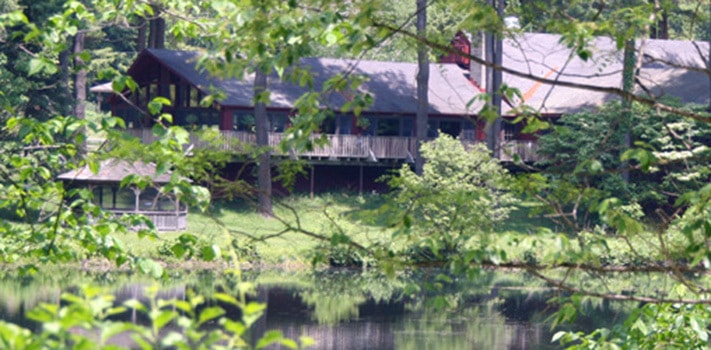It’s spring, we’re counting the omer, much is happening.
I wanted to say something about the nature of Isabella Freedman as a Jewishly-inflected retreat center – why that is so unique and vital and also hard to define, and then a few words about some of what’s happening at Freedman in the next few months.
The significance and necessity of a place like Freedman goes back to the flattening of Jewish life that traces back to the French Revolution, the enlightenment and the emancipation. Each, in various ways, good in and of itself – or a harbinger of good things which we take for granted – yet a toll was paid; not just the general toll of modernity, but also a toll within the Jewish community. Until then – and absolutely without over-romanticizing it – Jewish life was lived organically, ie with some degree of separation from the surrounding culture, in a world that encompassed Jewish space, Jewish time, Jewish language and Jewish thought.
These things cannot and should not be solely in their own bubble; but neither should they be flattened by the surrounding culture. But that’s what has happened, to some extent, after the French Revolution. Jewish life was Protestantized – turned from the religiously-grounded culture of a people into simply a religion, narrowly construed. Much was lost in the process. The “edifice complex” of 1950s American Jewish life is/was the clearest example of this – antiseptic suburban temples that mirrored their neighbors’ episcopal churches, and thus failed to do justice to the richness and range and breadth and texture of twenty centuries of Jewish life.
This is the backdrop to the vital necessity of Freedman, at the center of Hazon’s work.
It’s easy for participants to “have a great time” but to take so much of it for granted, including why it has the texture and feel and impact that it does. It is an institution that brings together Jewish place (a living breathing community, including a working farm and a wide range of people who connect to it) and Jewish time. Like the pre-modern shtetl, different people experience that time and place in different ways: I do or do not go to yoga, meditation, traditional services, renewal services, a hike, a learning session, etc etc. But we experience it commonly, that place and time and that unconscious – and unselfconscious – Jewishness.
This is critical. Absolutely critical.
When it is combined with world-class teachers – in a wide-range – and amplified and developed and cross-nurtured by Hazon’s teachings around the country – that is a powerful and potent and vital and needed institution.
And I’d add that, of course, part of what makes it so powerful is the ways that it is different from the pre-modern shtetl. The status of women is different; the status of people who are gay or queer is different; authority and engagement is different. The status of non-Jewish people and the wider society is different. But this only accentuates the power of the experience.
So with that as prelude and framing: we have two upcoming retreats that have as strong a line-up of teachers coming to Freedman as at any time in our history.
For our first ever JOFEE Network Gathering (JOFEE = Jewish Outdoor, Food, Farming & Environmental Education), June 6 – 9, we have Jakir Manela of Pearlstone Center, Adam Berman of Urban Adamah, Zelig Golden of Wilderness Torah, Sarah Chandler of Jewish Initiative for Animals, Shamu Sadeh of Adamah, Deborah Newbrun of Get, Set, Go! Community Adventures and Camp Tawonga, and many more remarkable teachers. It will be a chance to develop a foundation of earth-based spiritual practices, workshop on how to build just food systems, engage with text and tradition, hear about amazing projects taking root around the nation, and deeply learn hands-on pedagogical skills to bring back to your own work and communities.
For our Shavuot retreat, June 10 – 13, we’re grateful to have with us Rebbetzin Eve Ilsen, Shir Yaakov Feit, Aviva Chernick, Rabbi Brent Chaim Spodek, Rabbi David Evan Markus, Rabbi Rachel Barenblat, Rabbi Jill Hammer, Rabbi Jay Michaelson and Rabbi Kaya Stern-Kaufman. It’s fun and free spirited – a bikkurim parade for first-fruits (with goats); artisanal cheese-making workshops; an all-night vigil with learning, chanting, meditation, and midnight hikes; a daybreak musical outdoor Torah service – all in the peak mountain beauty of spring turning to summer.
You are warmly invited.





Comments are closed.